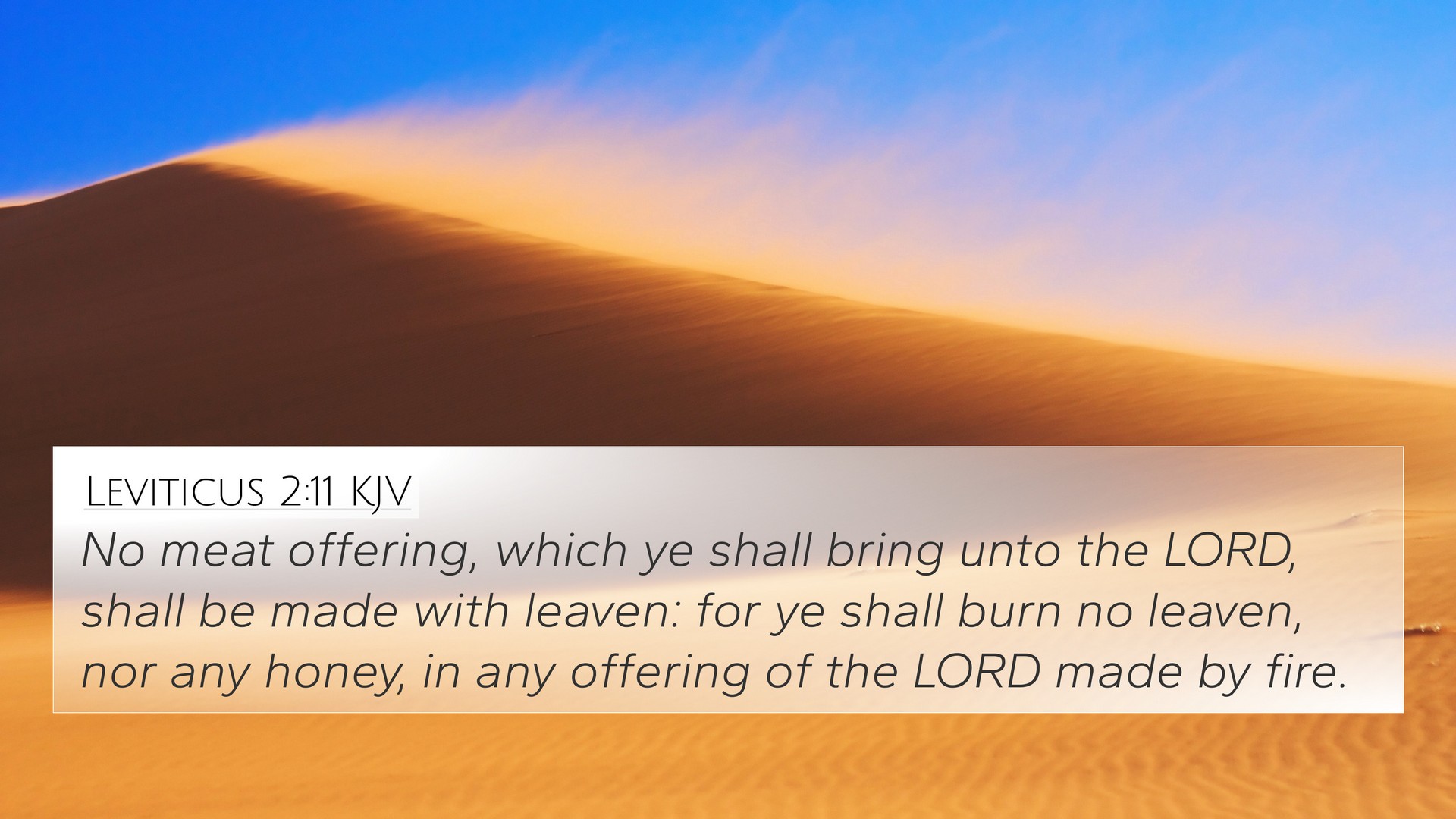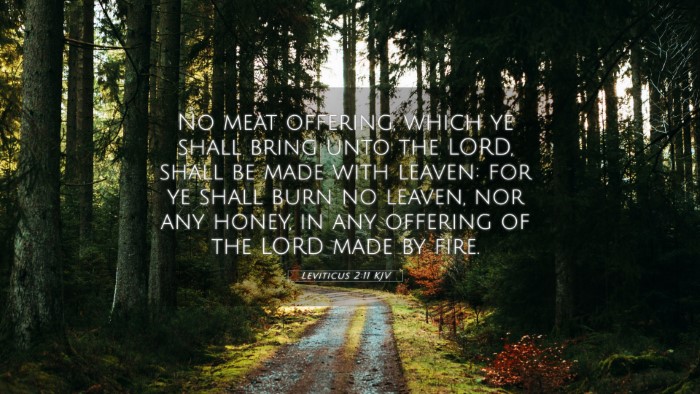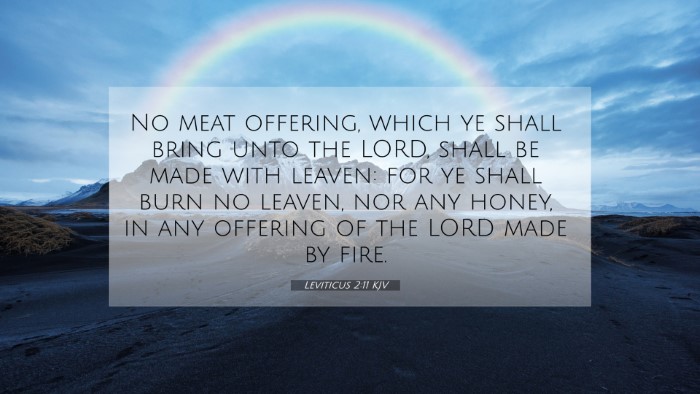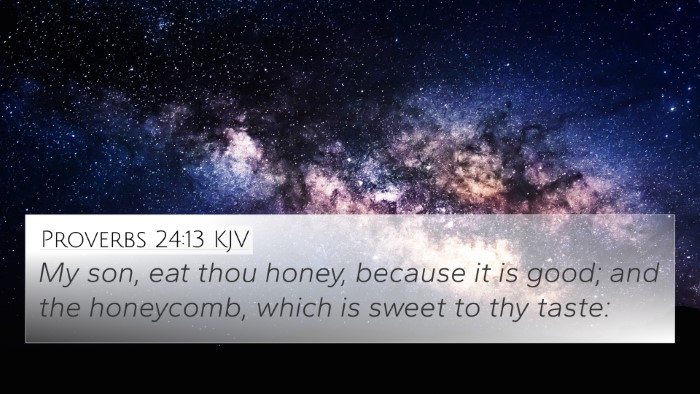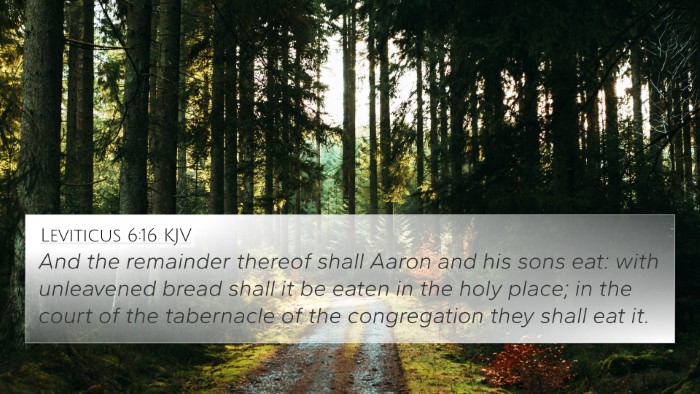Understanding Leviticus 2:11
Bible Verse: Leviticus 2:11 - "No grain offering that you bring to the Lord shall be made with leaven, for you shall not burn any leaven or any honey as a food offering to the Lord."
Meaning and Significance
This verse from Leviticus speaks about the regulations governing grain offerings. The prohibition of leaven (yeast) in offerings signifies purity and holiness, as leaven represents sin and corruption in biblical symbolism. Understanding this verse involves exploring its implications on worship, offerings, and the broader context of the Israelite sacrificial system.
Commentary Insights
Matthew Henry's Commentary
Henry emphasizes the idea that the Lord desires pure offerings. The absence of leaven and honey in the grain offerings signifies a desire for untainted worship. Leaven was well known in Jewish tradition as a symbol of sin (1 Corinthians 5:6-8), and the prohibition reflects God's holiness.
Albert Barnes' Notes
Barnes elaborates on the reasons behind the prohibition of leaven and honey in offerings. He states that the usage of these items would distort the purity that God requires. He connects this to the overall structure of the sacrificial system where God seeks acknowledgment of His holiness above all.
Adam Clarke's Commentary
Clarke notes that leaven was often used in other cultures for food but was unacceptable in sacrificial offerings. He highlights that this rule teaches us not only about physical sacrifices but also the spiritual cleanliness required in our offerings to God. Clarke also connects this concept to New Testament understandings of spiritual worship (Romans 12:1).
Cross-References
- Exodus 12:15: "Seven days you shall eat unleavened bread. On the first day, you shall remove leaven out of your houses..." - This verse reinforces the significance of removing leaven during Passover, symbolizing purity.
- 1 Corinthians 5:6-8: "Do you not know that a little leaven leavens the whole lump? Cleanse out the old leaven..." - Paul's depiction of leaven highlights its corrupting influence in church matters.
- Leviticus 23:17: "You shall bring from your dwelling places two wave loaves of two-tenth deals; they shall be of fine flour. They shall be baked with leaven." - A contrasting instruction showing context in acceptable offerings under certain conditions.
- Galatians 5:9: "A little leaven leavens the whole lump." - This New Testament reference emphasizes the dangers of allowing sin to influence the community.
- Matthew 16:6: "Jesus said to them, 'Watch and beware of the leaven of the Pharisees and Sadducees.'" - Here, leaven symbolizes false teachings and hypocrisy.
- Mark 8:15: "And he cautioned them, saying, 'Watch out; beware of the leaven of the Pharisees and the leaven of Herod.'" - This reiterates the danger of moral corruption from worldly influences.
- Colossians 3:5: "Put to death therefore what is earthly in you: sexual immorality, impurity, passion, evil desire..." - This speaks to the call for purity in one’s life, resembling the oil offering's purity.
Thematic Connections
Leviticus 2:11 connects deeply with the themes of purity, holiness, and true worship. It establishes a foundation for understanding how offerings were to be presented to God, linking significantly to teachings in both the Old and New Testaments. The idea of pure worship remains prevalent throughout scripture, calling believers to ensure their lives and offerings are free from sin.
Applying the Insights
Understanding Leviticus 2:11 through cross-references allows believers to grasp the importance of purity in their relationship with God. This insight can be applicable in modern Christian life, prompting self-examination and sincere worship devoid of sin. The thematic connections to New Testament teachings further emphasize this purity as central to true discipleship.
Conclusion
In summary, Leviticus 2:11 imposes a significant reflection on what it means to present acceptable offerings to God. Through understanding this verse in light of public domain commentaries and cross-referenced scripture, believers are urged to pursue a life of sincerity and holiness in their spiritual practices.
